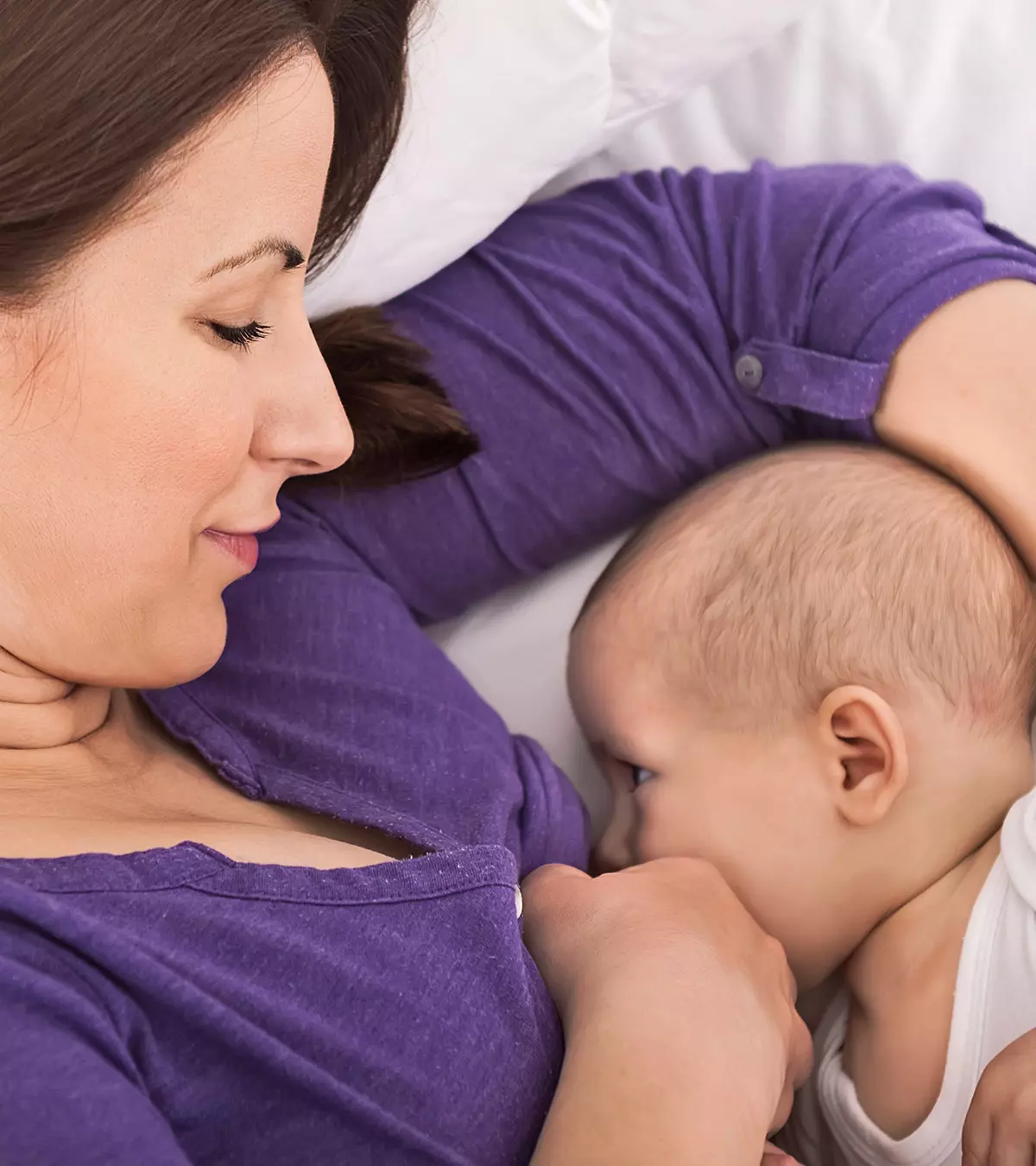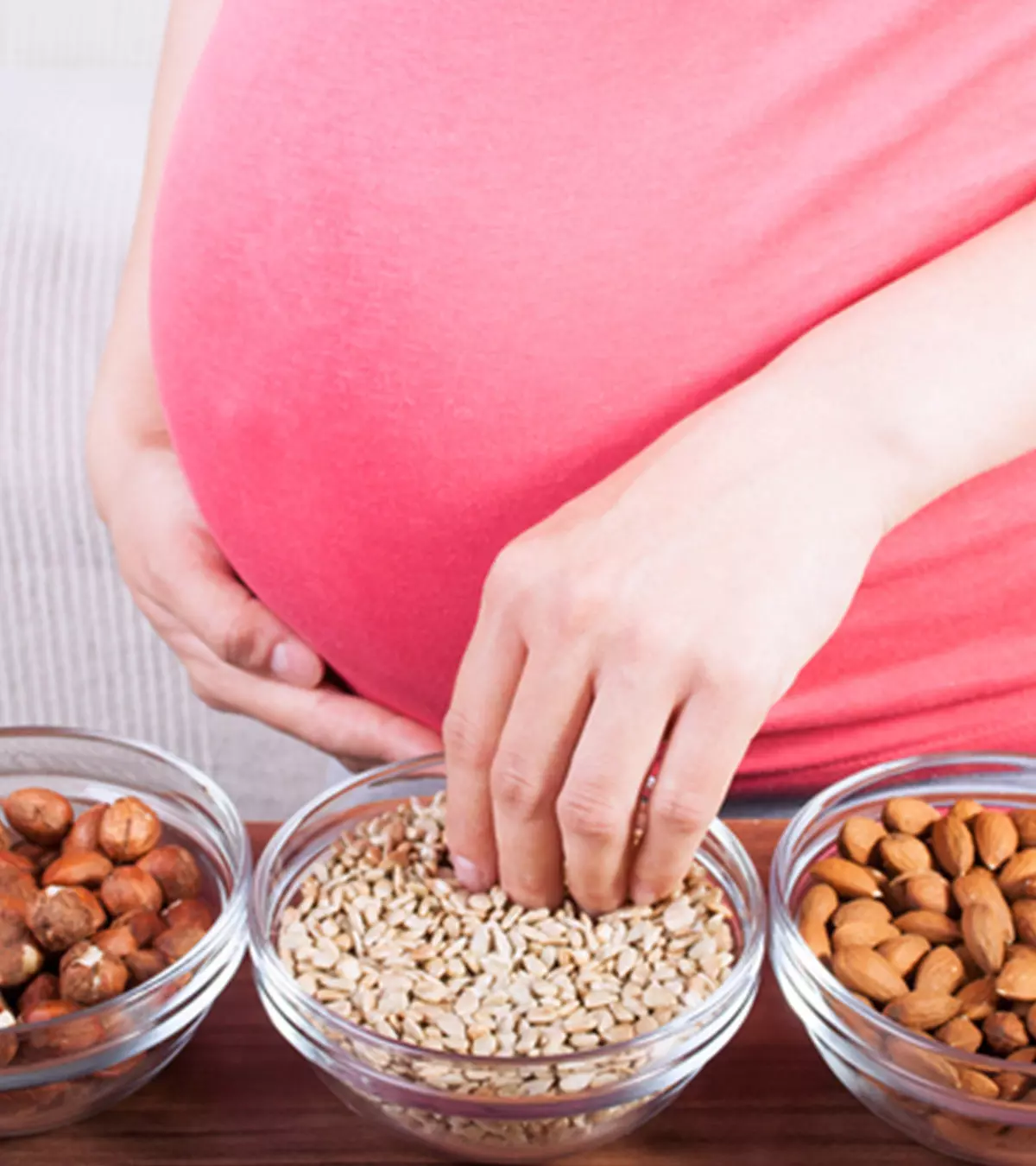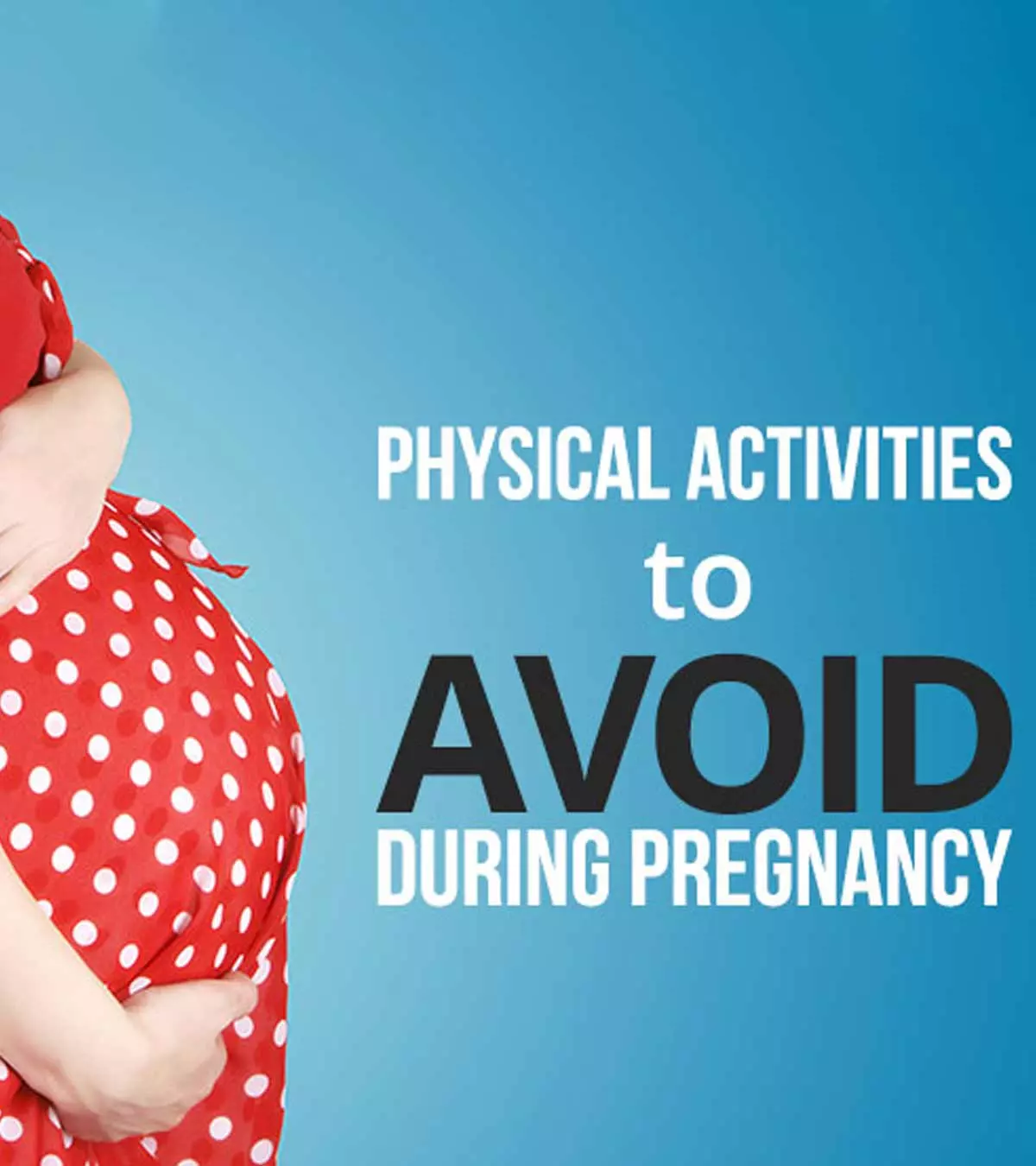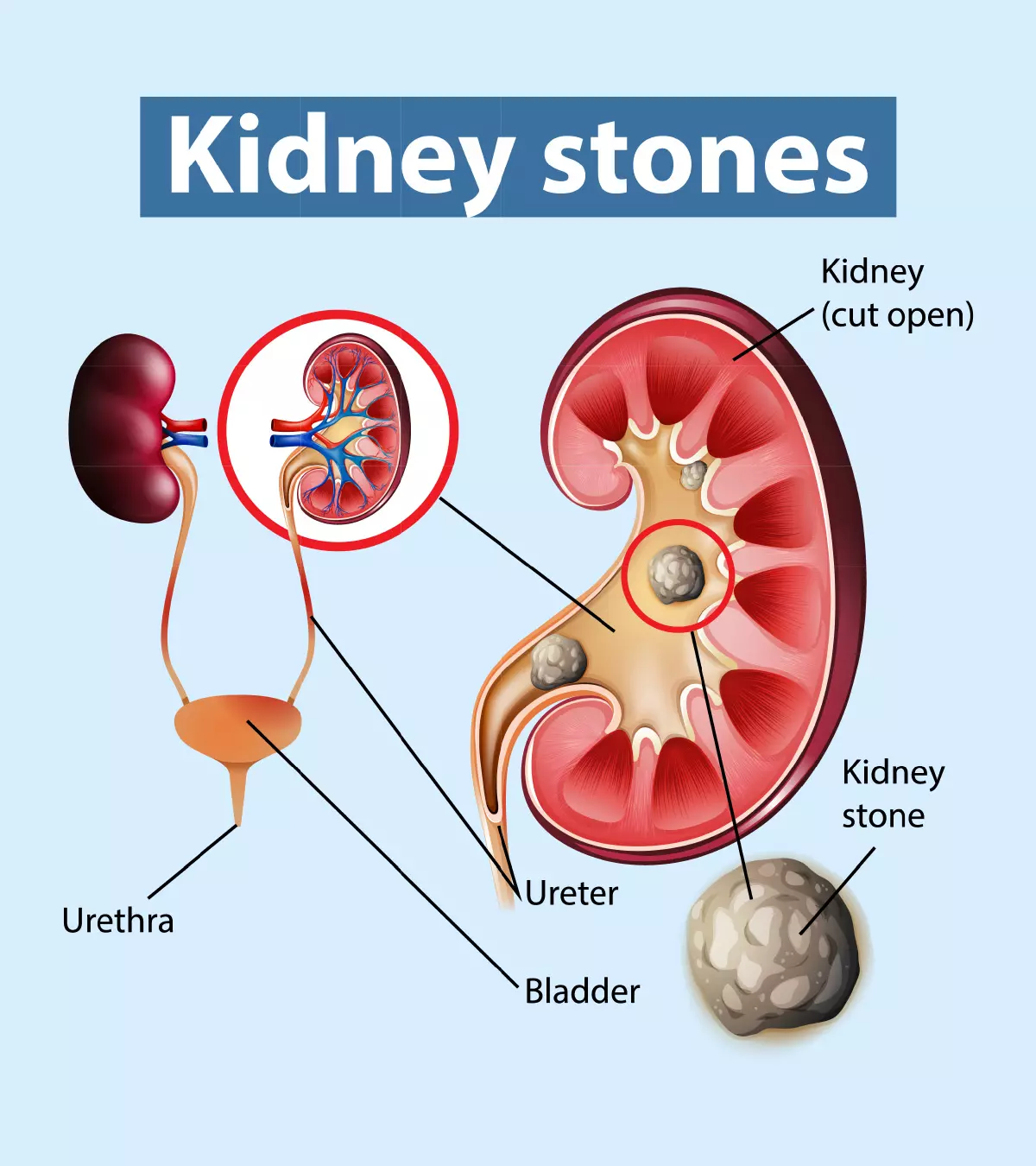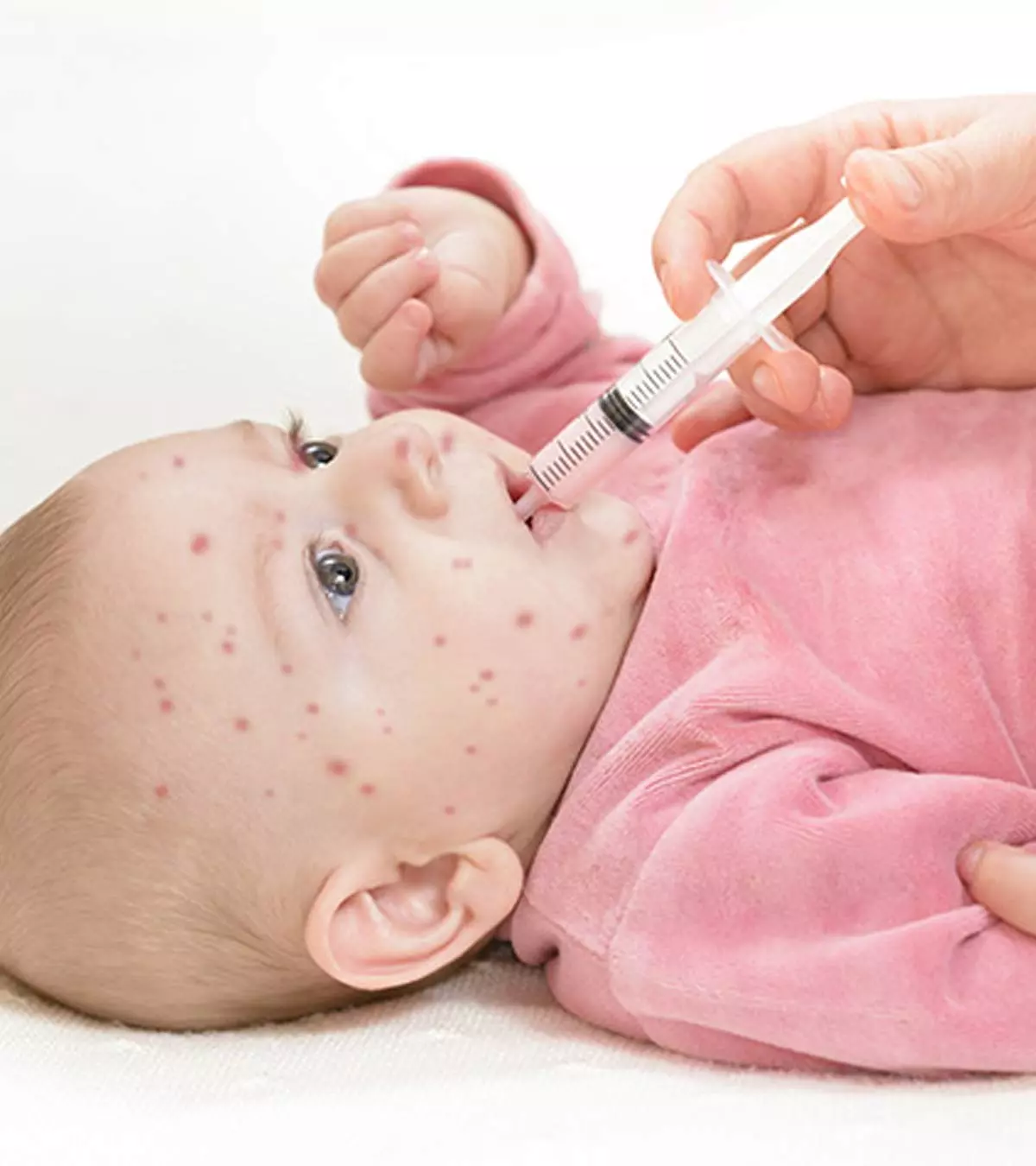

Image: Shutterstock
Measles is a highly contagious viral infection. The appearance of measles in babies can be stressful for both the parents and the baby. The common symptoms of measles include fever and rashes and bumps in the body.

As there’s no specific treatment for measles, the virus needs to run its course before the symptoms and signs disappear. So, how should you take care of a child with measles? Read on to know more about measles, including the causes, symptoms, and preventive measures.
What Causes Measles In Babies?
Measles is a viral infection that spreads through respiratory secretions expelled by an infected person when sneezing or coughing or through infected saliva. Measles, also called rubeola, is caused by the measles virus. The infection can be fatal, but the widespread availability of the measles vaccine helps prevent the disease. Nevertheless, the virus infects about 20 million individuals a year, with some infants at a higher risk than others.
Infants at higher risk of measles
The following groups of babies are at a greater risk of contracting the virus:
| Infant group | Description |
|---|---|
| Unvaccinated babies | Babies that do not have a vaccine-induced immunity |
| Immunosuppressed infants | Those who have AIDS, cancers such as leukemia, and diseases such as tuberculosis |
| Poor immunity | Malnourished and underweight babies; babies with vitamin A deficiency |
| Infants living in crowded conditions | For instance, those in day care centers |
There are up to 100,000 deaths per year worldwide documented for those below the age of five. The following are the symptoms in their order of appearance:
What Are The Symptoms Of Measles In Babies?
The measles virus has an incubation period of eight to 12 days after which the symptoms surface (1). Following are the symptoms in their order of appearance:
- Flu symptoms, sore throat, and runny nose are the first symptoms to emerge at the end of the incubation period. As these symptoms are similar to those of the common cold, it can be difficult to make the diagnosis at this point.
- 2 to 3 days before the rash starts some spots can be seen in the mouth. They are normally white and can be in clusters. These spots are called Koplik’s spots.
- Conjunctivitis, the infection of the outermost layer of the eye (conjunctiva), and fever are some other symptoms. The measles virus infects the layer causing redness and inflammation of the eyes, and moderate fever.
- After two to three days of the first symptoms, the baby develops measles rashes, which can first appear as dull blisters, but soon turn into large blotches of tiny reddish-brown rashes. The rashes appear on the forehead and gradually spread to the arms, torso, legs, and feet.
- The fever surges after the appearance of rashes and reaches a scorching 104°F to 105.8°F (40°C to 41°C). It is at this stage that the disease reaches its peak.
The fact that there are several other conditions with similar symptoms makes it difficult to recognize measles.
Conditions similar to measles
- Roseola is an infantile disease caused by the herpes virus. It leads to rashes all over the body, but the rashes have a lesser intensity than those caused by measles. The hallmark feature here is that there is fever typically for 3-4 days followed by the rash. Once the rash appears then typically the fever subsides.
- Rubella or German measles is a disease caused by rubella virus, but the symptoms are strikingly similar to those of measles. Unlike measles, rubella is mostly mild, with about 25-50% infected infants never displaying any symptoms (2).
The above conditions have a different prognosis than measles. The measles rash and high fever persist for five to eight days, eventually decreasing in intensity. The disease usually lasts for 14 days, and by the second week, the baby will show signs of recovery.
How Is Measles In Infants Diagnosed?
Doctors diagnose the condition by visual inspection of the characteristic measles rash. A blood test and sometimes a urine test is conducted to assess the presence of antibodies that target the measles virus. This helps differentiate it from other conditions and makes the treatment specific and accurate..
How Is Measles Treated?
There is no particular treatment for measles, and it cannot be treated with antibiotics since they are helpful only against bacteria. However, the following measures relieve the symptoms and bolster the immune system to clear the virus naturally.
- Immunization: Babies older than 12 months can be administered the measles, mumps, and rubella (MMR) vaccine if measles is diagnosed within 72 hours. If the blood tests reveal the infection was contracted before 72 hours, then an injection of immunoglobulin (IG) antibodies may be given (3). Since MMR vaccine is not recommended for infants under 12 months, an IG injection is the only alternative. IG injection is also suitable for infants below six months.
- Analgesic medication: Medicines such as paracetamol (also known as acetaminophen) are prescribed to relieve fever. These medicines are available over-the-counter, but should only be given to the baby after consulting a doctor. Analgesics such as aspirin are never given to babies since they can lead to health complications (8).
- Vitamin supplements: The inadequacy of vitamin A is linked to an increased risk of measles. Vitamin supplements are ideal only for infants above six months as babies below six receive adequate vitamins from breastmilk alone.
- Antibiotics: A baby’s compromised immunity leaves the body unguarded against a host of bacteria. The doctor may prescribe a precautionary antibiotic course in case of severe measles.
Like in the case of any viral infection, the patient has to be given supportive home care.
Home care for a baby with measles
Caring for a little one with measles is a vital part of treatment. Here is what parents can do to ensure the baby’s body fights the virus better:
- Give plenty of fluids: If the baby is younger than six months one should be completely healthy b, then breastfeed the infant more frequently. Babies older than six months can be given sips of water and fresh homemade fruit purees since fruits are rich in vitamins. Solid foods can be difficult and painful to chew due to Koplik’s spots in the mouth. Therefore, a liquid diet of purees and blended baby cereals in milk will help the little one get the necessary nourishment.
- Dim the room lighting: The infant should sleep in a dimly lit room. Infants with measles can find bright light uncomfortable and irritating.
- Lots of rest: Rest always helps in viral infections as it gives the immune system adequate time to prepare itself for the attack on the virus. Pause the baby’s playtime till he is better. If the toddler goes to a preschool, then take a month off. The little one should be completely healthy before he resumes any physical activities.
The treatment and supportive care for measles are necessary to help prevent complications.
Complications Of Measles In Babies
The measles virus keeps the immune system busy leaving the body exposed to other harmful germs. An untreated measles infection may indirectly cause the following diseases in the baby:
- Pneumonia is the most common complication of measles in infants. The measles virus increases the risk of contracting pneumonia, especially in infants with compromised immunity.
- Bronchitis is a bacterial infection of the bronchial tubes in the lungs and makes breathing difficult and painful for the patient.
- Bacteria can invade the middle ear and lead to ear infections such as otitis media.
- Upper respiratory infections, including the larynx (laryngitis) and trachea (croup), are common complications.
- Gastroenteritis is a potentially dangerous complication that can lead to dehydration.
- Involvement of the eyes that are not treated well can lead to vision loss.
- Encephalitis is the most severe of all complications, but the least common – only one in 1,000 measles patients develops this condition. Encephalitis is the swelling of the brain, which causes convulsions, seizures, and coma in severe cases.
The World Health Organization (WHO) states that most measles-related deaths are only caused by its complications (4). These complications can be prevented by prompt treatment. However, prevention is the best way to avoid the condition in the first place.
Can You Prevent Measles Through Vaccination?
Yes, measles is preventable through the administration of the MMR vaccine, which is a single prevention measure for measles, mumps, and rubella. In most countries, MMR vaccines are part of the usual immunization checklist for an infant. According to the American Academy of Pediatrics (AAP), the vaccine has led to a 99% drop in measles cases in the US since 1963.
In some countries a measles only vaccine is given at 6 months of age and then the MMR at one year.
Nevertheless, there are several misconceptions about the vaccine. Some unsubstantiated research has linked the vaccine to autism, but the claim has been vehemently debunked. There has been no link established between autism and any vaccine. Vaccines, as with any treatment that has an effect, has potential side-effects. These side-effects are mostly harmless e.g. local swelling and some pain at the site of the injection or a fine rash a few days after the vaccine. Even these minor side-effects are very rare. The vaccine has been declared safe by the AAP, UNICEF, and even the US government (5) (6). However, a parent should keep some points in mind before going for an MMR vaccination.
When Should My Baby Get The Measles Vaccine?
The MMR vaccine against measles is only administered to an infant after 12 months of age. In the countries where a vaccine for measles is given before the age of 12 months it is normally a measles only vaccine.
Some more points to know about MMR vaccination:
- In some cases, babies between six and 11 months can be given the vaccine, especially when the little one is traveling to a measles-prevalent country. The baby will still have to undergo the two usual vaccine shots at 12-15 months and between four and six years.
- Irrespective of their age, the vaccinated babies might have mild side effects such as low-grade fever and cold. They may also develop a moderate measles-like rash. Side effects appear six to12 days after vaccination. These effects are not dangerous and should not be a reason to evade vaccination. Also, they are seen only in about 15% of the vaccinated babies.
- Several hospitals and clinics offer the MMRV vaccine, which immunizes the baby against the varicella virus that causes chicken pox. The MMRV vaccine has a different immunization schedule. MMRV vaccine is equally safe and approved by AAP and the US Department of Health & Human Services (7).
These vaccines, however, do have some limitations and it is best to check with the doctor. The vaccine schedules of countries / regions differ depending on the risks of infections in these areas. Always consult your healthcare provider for the correct advice pertaining to your area.
Limitations to the MMR vaccine
An MMR vaccine may not be administered to infants in the following categories, even if the baby is older than 12 months.
- Allergic reaction to a previous dose of the vaccine.
- The MMR vaccine is generally not given to babies who have a compromised immunity or immunosuppressed infants such as those with AIDS or certain types of cancer.
- If the baby is suffering from an illness, disease, or is unwell in general, then the doctor might postpone the vaccination till the baby is completely alright.
In the above cases, doctors delay vaccinations or suggest safer alternatives such as immunoglobulin injections that provide short-term immunity.
Can A Baby Get Measles Even After Vaccination?
Experts believe that it is highly unlikely for a baby to get measles after vaccination (8). The first dose of vaccine provides 90% immunity while two doses give 99% immunity against measles. However, no vaccine gives 100% protection.
Nevertheless, only 3% of immunized individuals get the disease, and the symptoms are far less intense than those that get measles without vaccination (9).
Infants who get measles even after vaccination will tolerate the infection better and are less likely to spread the virus to healthy individuals. The benefits of vaccination, thus, outweigh the risk of skipping the immunization.
In addition to vaccination, preventive care is key to protect your infant from measles.
How Can Parents Help Prevent Measles In Babies?
Some easy and simple home prevention measures can help keep measles at bay:
- Breast milk protects: Studies have indicated that if a mother suffers from measles in her life, then she automatically passes her natural immunity to her baby through breastmilk (10). It is called passive immunity since the baby’s body gets ready-made antibodies. This immunity is so effective that the baby has some level of protection against measles till 12 months (11). Mothers who never acquired measles, should still feed the baby since breast milk is rich in antibodies and provides numerous scientifically-proven immunity benefits (12).
- Avoid high-risk situations: Measles spreads easily in overcrowded environments, and is common during winter and spring seasons. Being extra cautious around this time and staying away from overcrowded places will help shield the baby.
- Maintain hygiene: The measles virus can remain on a surface for two hours, ready to infect anyone who comes into contact with it. Cleanliness and hygiene are essential to prevent the infection. Always wash the baby’s hands after you come from outdoors, and clean his personal items and keep them in a hygienic state.
Immunization of family members also considerably reduces the baby’s risk of contracting the virus.
Frequently Asked Questions
1. Can babies survive measles?
Survival is possible, but the outlook is not too promising. One or two out of 1000 children in the US and one of three children outside the US die due to measles every year. Some children may face long-term repercussions due to the disease (14).
2. How long does it take for baby measles to go away?
The symptoms of the condition may last for up to 14 days in babies (15).
3. Are baby measles itchy?
For most babies, the rash from measles is not itchy (16).
Measles in babies is a contagious infection that spreads through infected saliva. Babies with poor immunity are more at risk of this infection. If your baby has measles, they may have flu, runny nose, conjunctivitis, and measles rashes. Doctors treat the condition with analgesic medications and vitamin supplements. Antibiotics are given to babies with compromised immunity. At home, give plenty of fluids and adequate rest to babies. Measles may cause pneumonia, bronchitis, and other life-threatening complications if left untreated. Babies who have recovered from measles have natural immunity against it for the rest of their lives (13). However, this does not mean that one should stay away from vaccination. Vaccination and simple preventive tips are the best ways to stay protected from measles.
References
- Measles.
https://www.healthychildren.org/English/health-issues/vaccine-preventable-diseases/Pages/Measles.aspx - German Measles (Rubella).
https://www.healthychildren.org/English/health-issues/vaccine-preventable-diseases/Pages/German-Measles-(Rubella).aspx - Measles (Rubeola).
https://www.health.harvard.edu/a_to_z/measles-rubeola - Measles.
https://www.who.int/en/news-room/fact-sheets/detail/measles - Protecting Young Children From Vaccine Preventable Diseases.
https://www.unicef.org/eca/media/14246/file - Vaccine (Shot) for Measles.
https://www.cdc.gov/vaccines/parents/diseases/measles.html?CDC_AA_refVal=https%3A%2F%2Fwww.cdc.gov%2Fvaccines%2Fparents%2Fdiseases%2Fchild%2Fmeasles.html - MMR Vaccine: What You Need To Know.
https://www.healthychildren.org/English/safety-prevention/immunizations/Pages/Measles-Mumps-Rubella-Vaccines-What-You-Need-to-Know.aspx - MMR (measles mumps and rubella) vaccine.
https://www.nhs.uk/vaccinations/mmr-vaccine/ - Questions About Measles.
https://www.cdc.gov/measles/about/faqs.html - F D Adu and J A Adeniji; Measles antibodies in the breast milk of nursing mothers.
https://pubmed.ncbi.nlm.nih.gov/8886155/ - How long do babies carry their mother’s immunity?.
https://www.nhs.uk/pregnancy/labour-and-birth/after-the-birth/getting-to-know-your-newborn/ - The Benefits of Mother’s Milk.
https://www.universityofcalifornia.edu/news/benefits-mothers-milk - Comparing Natural and Vaccine Immunity.
https://www.michigan.gov/-/media/Project/Websites/mdhhs/Adult-and-Childrens-Services/Children-and-Families/Immunization-Information/LHD/Waiver_Ed_Natural_Immunity.pdf?rev=ad5bf279bcae4bdca060d075be344480 - Protecting Your Baby from a Measles Outbreak FAQs
https://www.healthychildren.org/English/safety-prevention/immunizations/Pages/Protecting-Your-Baby-from-a-Measles-Outbreak-FAQs.aspx - Measles in babies and children
https://www.pregnancybirthbaby.org.au/measles-in-babies-and-children#:~:text=A%20child%20who%20is%20infected - Measles
https://www.nhs.uk/conditions/measles/
Community Experiences
Join the conversation and become a part of our nurturing community! Share your stories, experiences, and insights to connect with fellow parents.
Read full bio of Dr. Wayne Hough
Read full bio of Rohit Garoo



